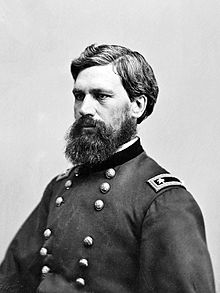Oliver O. Howard
| Oliver Otis Howard | |
|---|---|

Portrait of Oliver O. Howard by Mathew Brady, during the Civil War
|
|
| Nickname(s) | The Christian General |
| Born |
November 8, 1830 Leeds, Maine |
| Died | October 26, 1909 (aged 78) Burlington, Vermont |
| Place of burial | Lake View Cemetery, Burlington, Vermont |
| Allegiance |
United States of America Union |
| Service/branch |
United States Army Union Army |
| Years of service | 1854–1894 |
| Rank |
|
| Commands held |
XI Corps IV Corps Army of the Tennessee Freedmen's Bureau United States Military Academy |
| Battles/wars |
|
| Awards |
Thanks of Congress Medal of Honor |
| Other work | President, Howard University |
| Signature | |
Oliver Otis Howard (November 8, 1830 – October 26, 1909) was a career United States Army officer and a Union general in the American Civil War. As a brigade commander in the Army of the Potomac, Howard lost his right arm while leading his men against Confederate forces at the Battle of Fair Oaks/Seven Pines in June 1862, an action which later earned him the Medal of Honor. As a corps commander, he suffered two humiliating defeats at Chancellorsville and Gettysburg in May and July 1863, but recovered from the setbacks as a successful corps and later army commander in the Western Theater.
Known as the "Christian general" because he tried to base his policy decisions on his deep religious piety, he was given charge of the Freedmen's Bureau in mid-1865, with the mission of integrating the freed slaves into Southern society and politics during the second phase of the Reconstruction Era. Howard took charge of labor policy, setting up a system that required free slaves to work on former plantation land under pay scales fixed by the Bureau, on terms negotiated by the Bureau with white land owners. Howard's Bureau was primarily responsible for the legal affairs of the freedmen. He attempted to protect freed blacks from hostile conditions, but lacked adequate power, and was repeatedly frustrated by President Andrew Johnson. Howard's allies, the Radical Republicans, won control of Congress in the 1866 elections and imposed Radical Reconstruction, with the result that freedmen were given the vote. With the help and advice of the Bureau, freedmen joined Republican coalitions and won at the ballot boxes of most of the southern states. Howard was also a leader in promoting higher education for freedmen, most notably in founding of Howard University in Washington and serving as its president 1867–73.
...
Wikipedia
